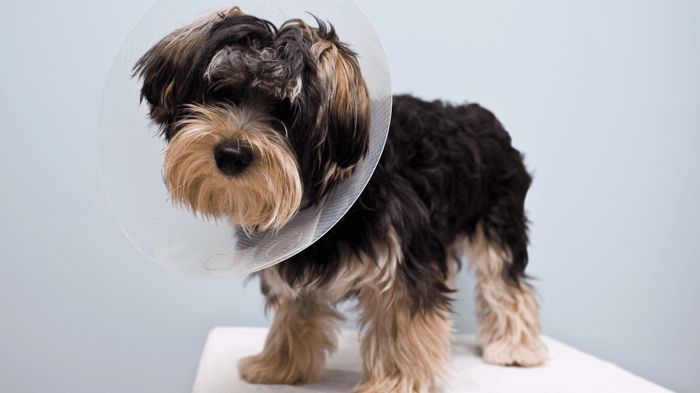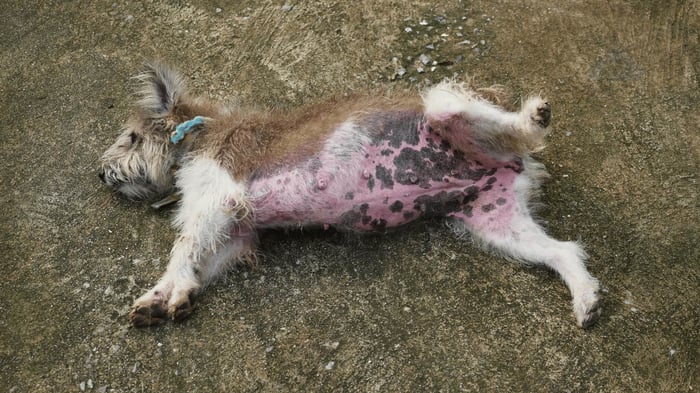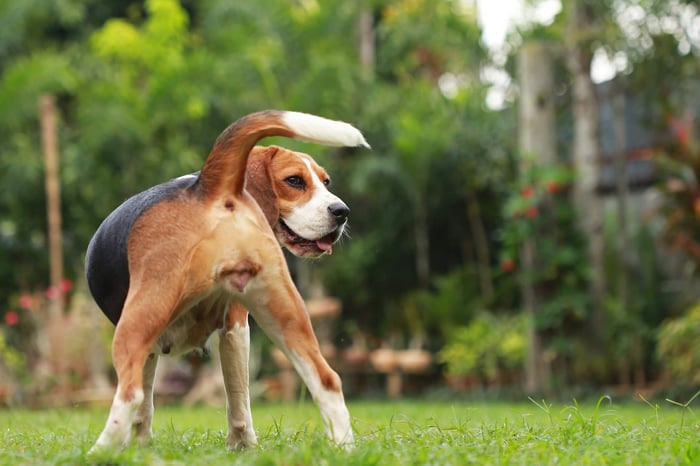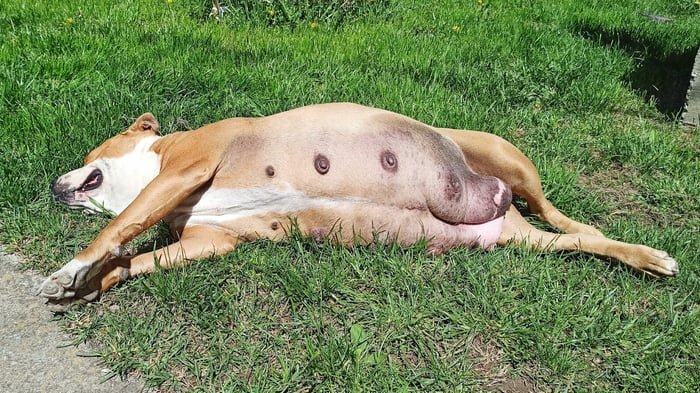Neutering a dog is a standard procedure that involves removing the testicles of a male dog. While it is a routine surgery, it is still essential for dog owners to understand what to expect after neutering your dog. This article will provide an overview of post-neuter care.
Besides the normal post-surgery dizziness and discomfort, you can expect much less territorial peeing. Of course, immediately after surgery, your dog will need a little time to rest and recover, so make sure they have a comforting dog bed to sleep in.
It is important for dog owners to closely monitor their dog’s behavior and follow vet instructions to ensure a smooth recovery. We have the help of expert research and books like High Quality, High-volume Spay and Neuter for a complete guide on what to expect after neutering.
So, What Can You Expect After Neutering A Dog?
After neutering, it is common for a dog to experience post-surgery discomfort and dizziness. Neutering can cause them to be tired and groggy, have reduced appetite, and even have a slightly changed personality for a few days. Long-term behavioral changes to expect after neutering your dog include reduced aggression, reduced territorial marking, less roaming, and an overall calmer temperament.
Neuter is less complicated than spaying and has a faster recovery period. Still, there is much overlap between what to expect after spaying and after neutering. No matter how an individual feels about the procedure, neutering is widespread and typically goes very smoothly.
Population control is the main incentive behind neutering, with the “adopt, don’t shop” movement frowning down upon backyard breeding. Be sure to read our article on whether neutered dogs can still mate to discover the procedure’s efficiency.
Here is a sum up of what to expect after the neuter procedure that we get into more depth later in the article.
- Tiredness, sleepiness, and discomfort for the first few days;
- Reduced aggression;
- Decreased roaming;
- Reduced marking;
- Changes in energy levels; and
- Changes in appetite.
It is important to note that every dog is different, and the effects of neutering may vary. Pet owners should consult their veterinarian to discuss the best course of action for their individual dog.
You may also like:
- Can dogs have an abortion?
- Signs your male dog wants to mate
- When does a puppy become a dog?
- How to tell if a dog is pregnant
Understanding Neutering
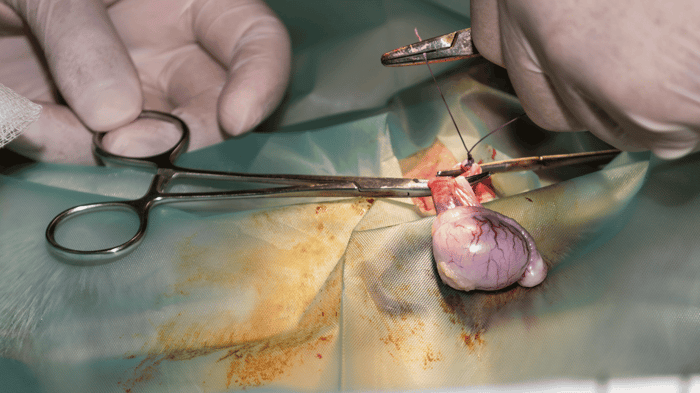
Neutering is a surgical procedure that removes the testicles of a male dog. The process is less commonly known as castration. It is a common procedure performed for various reasons, including controlling the pet population, reducing aggression, and preventing certain health problems.
The procedure involves making an incision in the scrotum and removing the testicles. The dog is placed under general anesthesia during the procedure, and it usually takes about 30 minutes to complete. The dog is then monitored for a few hours after the process to ensure no complications.
After the procedure, the dog may experience discomfort and swelling in the scrotum. It is essential to keep the area clean and dry to prevent infection. The dog may also need to wear a cone to prevent him from licking or biting the incision site.
However, it is essential to note that neutering is a permanent procedure and should only be done after careful consideration and consultation with a veterinarian.
Additionally, studies show that It’s best to neuter your dogs when they stop growing or are about to. Therefore, small breed males need to be neutered at around 6 to 8 months, while large to giant should wait until 12 to 18 months.
This is because growing research has shown that early-age neutering increases the risk of joint issues and cancers like osteosarcoma, hemangiosarcoma, lymphoma, and mast cell tumors. You can read our article on signs your dog needs to be neutered for a complete guide.
Immediate Aftercare After Neutering Your Dog
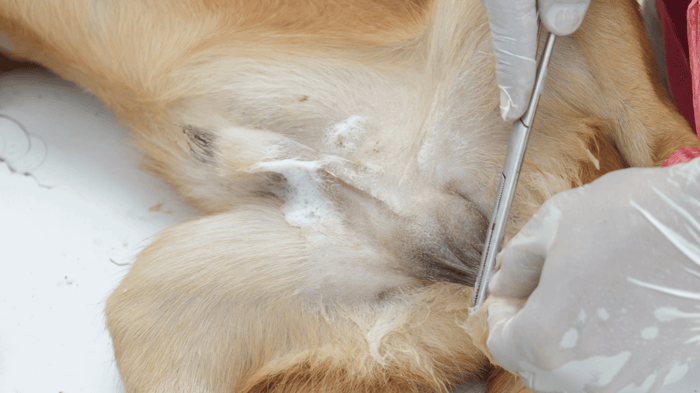
You can expect your dog to be a bit dazed and out of it for a few hours after the procedure. They may also seem lost and a bit clingy for the next few days. However, most dog owners are surprised by how fast their dogs recover from a neuter.
After neutering a dog, it’s essential to provide immediate aftercare to ensure a smooth recovery. Here are some things to keep in mind:
Activity Level
It’s vital to restrict your dog’s activity level for the first few days after surgery. This means no running, jumping, or playing. Your dog should be kept in a quiet, comfortable area to rest and recover.
Feeding and Water
Your dog may not have much appetite immediately after surgery, but offering them small amounts of food and water is essential. Make sure they have access to fresh water at all times. Also, monitor their bowel movements to ensure they are not constipated.
Medication
Your veterinarian may prescribe pain medication or antibiotics for your dog after surgery. It’s essential to follow the dosage instructions carefully and give the medication as directed. Contact your veterinarian if you have any questions or concerns about the medication.
Incision Care
Your dog’s incision site will need to be monitored and kept clean. Your veterinarian may provide specific instructions for cleaning and caring for the incision site. It’s essential to follow these instructions carefully to prevent infection.
Sometimes, your dog’s stitches may come open without bleeding, in which case, it’s best to consult your vet.
Follow-Up Care
Your veterinarian may schedule a follow-up appointment to check your dog’s progress and remove any stitches. It’s essential to attend this appointment and follow any additional instructions your veterinarian provides.
By providing immediate aftercare for your dog after neutering, you can help ensure a smooth and successful recovery.
Physical Changes to Expect After Neutering Your Dog
After neutering a dog, several physical changes can be expected. These changes may vary depending on the dog’s age, breed, and size. Here are some of the changes that are commonly seen after neutering a dog:
Reduced Sexual Behaviors
One of the most significant changes that occur after neutering a dog is a reduction in sexual behaviors. This is because neutering removes the testicles responsible for producing testosterone.
Testosterone is the hormone that drives sexual behaviors in male dogs. Therefore, neutering a dog can reduce the frequency of mounting, humping, and other sexual behaviors. However, you may still observe non-sexual humping in your neutered male due to excitement or playfulness.
Related: Why do dogs hump a certain person
Weight Gain
Neutered dogs are at a higher risk of gaining weight than intact dogs. This is because neutering can reduce the basal metabolic rate, making them more prone to weight gain. A study of 268 dogs from Zealand found a link between neutering and being overweight. However, the researchers were keen to state that correlation does not mean causation.
Related: Why does my dog act hungry all the time?
Coat Changes
Some dogs may experience changes in their coat after neutering. Neutered dogs may have a softer, thicker, or more prone to matting coat. This is because neutering can alter the balance of hormones in the body, which can affect the quality of the coat.
Urinary Incontinence (in Female Dogs)
Neutering typically refers to male dogs. But it’s worth mentioning that In some cases, spayed female dogs may develop urinary incontinence, especially as they get older. This is a condition where the dog is unable to control their bladder and may leak urine. This condition is more common in large-breed dogs and may require medical treatment.
No More Siring Litters
As expected, neutering prevents your dog from fathering unwanted litters, which is essential if you don’t plan to breed him responsibly.
Also see: Littermate Syndrome
Behavioral Changes to Expect
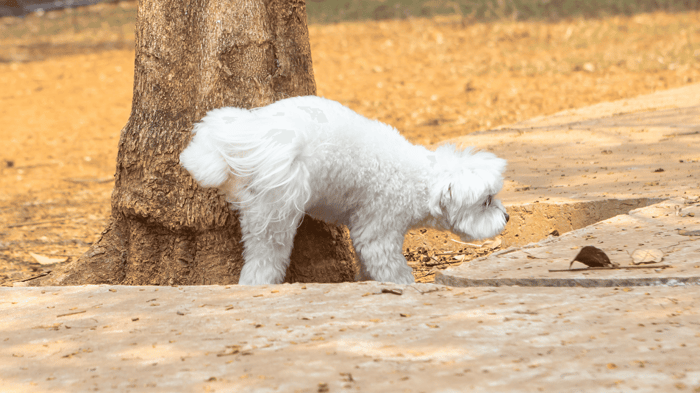
After neutering a dog, there are several behavioral changes that
pet owners should expect. These changes can vary depending on the dog’s breed, age, and temperament. However, neutering can generally lead to a calmer and more well-behaved dog.
Activity Levels
One noticeable change after neutering is a decrease in the activity levels as they recover. However, this is a short-lived change since neutering barely changes a dog’s personality, except by reducing sex-related aggression.
Aggression
Neutering can also lead to a decrease in aggression in dogs. This is because testosterone is a hormone that can increase aggressive behavior in male dogs. After neutering, pet owners may notice that their dog is less likely to display aggressive behavior towards other dogs or people.
How to discipline your dog after fighting
Urination Behavior
Neutering can also have an impact on a dog’s urination behavior. Male dogs may be less likely to mark their territory since they’re not interested in mating. Additionally, neutering can reduce the risk of male dogs developing prostate problems, which can lead to urinary incontinence.
Overall, while some behavioral changes are expected after neutering a dog, these changes are generally positive and can lead to a happier and healthier pet.
Long-Term Health Implications of Neutering
Weight Gain
After neutering a dog, there is a risk of weight gain due to metabolic changes and decreased activity levels. According to research, neutered dogs are more likely to be overweight or obese than intact dogs.
Pet owners should monitor their dog’s weight and adjust their diet and exercise accordingly to prevent obesity.
Risk of Certain Diseases
Neutering a dog can reduce the risk of certain diseases, such as testicular cancer and prostate disease. However, it may increase the risk of other diseases like osteosarcoma, hemangiosarcoma, and lymphoma. This is especially true if a dog is neutered before one for large dogs and six months for small breeds.
Hormonal issues
Neutering removes the source of sex hormones (testosterone), which may affect certain aspects of a dog’s physiology, including muscle development and bone density. This can potentially impact muscle strength and skeletal health if neutering is done before a dog sexually matures.
Potential Complications of a Neuter Procedure
After neutering a dog, there are several potential complications that owners should be aware of. While most neutering procedures are safe, there is always a risk of complications. The following are the most common potential complications after neutering a dog.
Infection
Infection is a common complication after neutering a dog. It can occur at the incision site if the wound is improperly cleaned and cared for. Signs of infection include redness, swelling, and discharge from the incision site.
If an untreated infection can spread to other parts of the body and become more serious. Owners should monitor their dog’s incision site closely and contact their vet if they notice any signs of infection.
Hemorrhage
Hemorrhage, or excessive bleeding, is another potential complication of neutering a dog. It can occur during or after the surgery and can be life-threatening if not treated promptly. Signs of hemorrhage include excessive bleeding from the incision site, pale gums, and weakness.
Blood blisters
Blood blisters, or hematomas, can occasionally develop at the surgical site after neutering a male dog. These blisters form when blood vessels are damaged during the surgery, causing blood to accumulate under the skin.
While small hematomas can resolve on their own, larger ones may require medical attention. You can read our linked article for more on blood blisters.
Post-Operative Pain
After neutering a dog, there is usually some post-operative pain. However, in some cases, the pain can be severe and require additional pain medication. Signs of post-operative pain include whining, restlessness, and reluctance to move. Owners should follow their vet’s instructions for pain management and contact them if they notice any signs of severe pain.
When to Consult a Vet
After neutering a dog, it is common for them to experience some discomfort and changes in behavior. However, certain signs may indicate a more severe issue that requires veterinary attention.
If a dog exhibits any of the following symptoms after being neutered, it is recommended to consult a veterinarian immediately:
- Excessive bleeding from the surgical site;
- Swelling or discharge from the surgical site;
- Refusal to eat or drink for more than 24 hours;
- Persistent vomiting or diarrhea;
- Lethargy or weakness;
- Signs of pain, such as whining or whimpering;
- Difficulty urinating or defecating; and
- Signs of infection, such as fever or pus at the surgical site.
It is important to note that not all dogs will experience these symptoms after being neutered. However, if a dog is exhibiting any of these signs, it is best to err on the side of caution and seek veterinary attention.
In addition, if a dog’s behavior changes drastically after being neutered, such as becoming aggressive or overly anxious, it may be worth consulting a veterinarian or animal behaviorist to address any underlying issues.
Frequently Asked Questions (FAQs)
How long does it take for a dog to recover from being neutered?
Do male dogs change after being neutered?
What are the signs of infection after neutering a dog?
What is normal swelling after neutering, and how long does it last?
What happens to a dog’s testicles after neutering?
Does neutering a dog calm them down?
Final Thoughts
Neutering a dog is a common procedure that can benefit both the dog and the owner. While some risks are associated with the process, the benefits generally outweigh the risks. It is essential to discuss the procedure with a veterinarian and make an informed decision based on the individual needs of the dog. Some dogs may experience temporary changes in behavior or appetite, but these usually resolve within a few days to a week.


